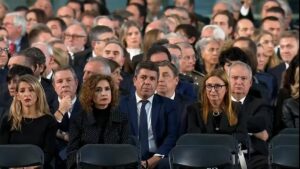Since he returned to the White House, Donald Trump has undertaken several business battles in which his personal preferences have been mixed, such as changing the Coca-Cola formula. One of the last has begun with the banking and financial sector, a priori, one of the pillars of the US economic strength.
The American president has charged in recent weeks against one of the giants of the sector, Goldman Sachs. The reason, which does not agree with the analysis and forecasts that the entity has made on the impact of tariffs. It is not his only complaint: he has also pointed to other banks because, he says, they rejected him as a client.
“The banks discriminated a lot,” Trump said a few days ago during a Interview with CNBC television. The Republican politician pointed out, on the one hand, JPMorgan, because he would have demanded to close his accounts, although he did not say when they asked him or the reason. On the other, Bank of America, because it would not have allowed him to make a deposit of about 1,000 million dollars (more than 850 million euros to the current change). Trump did not give more details of these two personal disputes with the great bank, only that “his people” had informed him of both negatives by the two largest US financial entities.
“I ended up going to small banks, everywhere,” he added. “They did everything possible to destroy Trump.” “Banks are not afraid of anything except a regulator. To their regulators and their wives,” he said during that interview.
Behind those words are not only criticism of the sector, also a change in banking regulation because, according to Trump, banks have carried out discriminatory practices. According to the Republican Administration, entities have been rejecting clients for political or religious reasons, as would have been the case of the American president.
Both JPMorgan and Bank of America have denied that you reject the current US president as a client for ideological reasons, according to the agency Bloomberg. In recent months, the executive director of JP Morgan, Jaime Dimon, has openly criticized Trump's fiscal policy, the challenges facing the US economy for its enormous indebtedness, or the impact of the president's tariffs.
Discriminate against beliefs and the assault on the Capitol
In the background of these criticisms is the change of regulation that the Trump administration has implemented to end what it calls “politicized or illegal dismissal.” According to the Presidential order approved a few days agofinancial institutions “have developed” in recent years “unacceptable practices to restrict the access of persons and companies, respectful of the law, financial services” for their “political, religious beliefs or lawful commercial activities.”
This last term would include, for example, the refusal of banks to allocate funds to arms companies, considering that this type of activity breaches their ethical investment criteria. Therefore, with this presidential order, there are doubts about what will happen to this type of financing.
The US government also links this decision to the assault on the Capitol of January 6, 2021. “Some financial institutions participated in government -led surveillance programs” on “people who participated in activities and causes associated with conservatism and political right after the events that occurred in or near the Capitol of the United States,” says the White House in its statement.
The way of operating of the bank, according to Trump's administration, would have caused people to have been left out of the financial system “based on their political affiliations, religious beliefs or lawful commercial activities” and “have suffered frozen payrolls, unavoidable debts and interests and other significant damage to their way of life, reputation and financial well -being”. “These practices are incompatible with a free society and the principle that the provision of banking services should be based on material, measurable and justifiable risks,” says the aforementioned presidential order.
What will change?
The Trump government gives financial regulators 180 days to eliminate any regulations that entail the use of concepts such as reputational risk linked to political or religious issues. It also gives the financial system a four -month period to “identify and return to any client” to which the service has been “denied through a politicized or illegal dismissal action.”
Finally, it warns about possible sanctions. Specifically, it gives four months to federal banking regulators to identify “to the financial institutions subject to their jurisdiction that have had past or current policies or practices” linked to that action of “dismissal” and take “the appropriate corrective measures”. There it includes “the imposition of fines” and, if there are no changes by the entities, the facts can become sent “to the attorney general for an appropriate civil action, as appropriate,” summarizes the White House.
The 'boss' of Goldman Sachs
Apart from that generalized criticism of the bank for its performance, Trump has also pointed out, in particular, one of the great banks, Goldman Sachs, and his CEO, David Solomon. In this case, because The entity has defended in one of its analysis that tariffs entail a price increase that American consumers will pay. In Julio, the underlying inflation – which excludes energy and food – rose in the US in two tenths and stood at 3.1%.
“The tariffs have not caused inflation or any other problem for the United States, except for the huge amounts of cash that have entered the treasury coffers,” Trump said in his social truth network. “David Solomon and Goldman Sachs refuse to recognize the merit of those who deserve it.” “I think David should look for a new economist or, perhaps, should focus on being DJ and not bothered to direct an important financial institution,” he added.
It is true that Goldman Sachs first executive has been DJ for years. In fact, he came to participate in festivals such as Lollapalooza. However, two years ago, the entity's board of directors urged him to leave that personal activity for understanding that he could involve a distraction to his work.





